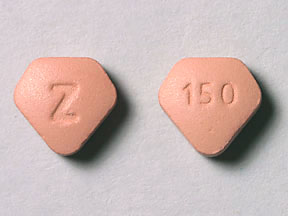Zantac Interactions
There are 153 drugs known to interact with Zantac (ranitidine), along with 6 disease interactions, and 1 alcohol/food interaction. Of the total drug interactions, 13 are major, 73 are moderate, and 67 are minor.
- View all 153 medications that may interact with Zantac
- View Zantac alcohol/food interactions (1)
- View Zantac disease interactions (6)
Most frequently checked interactions
View interaction reports for Zantac (ranitidine) and the medicines listed below.
- albuterol
- aspirin
- Benadryl (diphenhydramine)
- Claritin (loratadine)
- Cymbalta (duloxetine)
- Fish Oil (omega-3 polyunsaturated fatty acids)
- Flonase (fluticasone nasal)
- gabapentin
- hydrochlorothiazide
- ibuprofen
- levothyroxine
- Lipitor (atorvastatin)
- lisinopril
- melatonin
- metformin
- Nexium (esomeprazole)
- omeprazole
- prednisone
- Protonix (pantoprazole)
- Singulair (montelukast)
- Synthroid (levothyroxine)
- tramadol
- trazodone
- Tylenol (acetaminophen)
- Vitamin B12 (cyanocobalamin)
- Vitamin C (ascorbic acid)
- Vitamin D3 (cholecalciferol)
- Xanax (alprazolam)
- Zoloft (sertraline)
- Zyrtec (cetirizine)
Zantac alcohol/food interactions
There is 1 alcohol/food interaction with Zantac (ranitidine).
Zantac disease interactions
There are 6 disease interactions with Zantac (ranitidine) which include:
More about Zantac (ranitidine)
- Zantac consumer information
- Compare alternatives
- Reviews (83)
- Drug images
- Side effects
- Dosage information
- Patient tips
- During pregnancy
- Generic availability
- Support group
- Drug class: H2 antagonists
- Breastfeeding
Related treatment guides
Drug Interaction Classification
| Highly clinically significant. Avoid combinations; the risk of the interaction outweighs the benefit. | |
| Moderately clinically significant. Usually avoid combinations; use it only under special circumstances. | |
| Minimally clinically significant. Minimize risk; assess risk and consider an alternative drug, take steps to circumvent the interaction risk and/or institute a monitoring plan. | |
| No interaction information available. |
See also:
Further information
Always consult your healthcare provider to ensure the information displayed on this page applies to your personal circumstances.


